Key takeaways:
- Sharing DNA can uncover ancestral connections and health information, but it raises privacy and ethical concerns, impacting familial relationships and personal identity.
- There are significant risks associated with genetic data sharing, including potential discrimination, identity theft, and emotional consequences from uncovering family secrets.
- The importance of informed consent is crucial, as one person’s DNA test can reveal sensitive information about their relatives, affecting family dynamics.
- Navigating the ethical implications of DNA sharing requires careful consideration of how discoveries may impact both the individual and their loved ones.
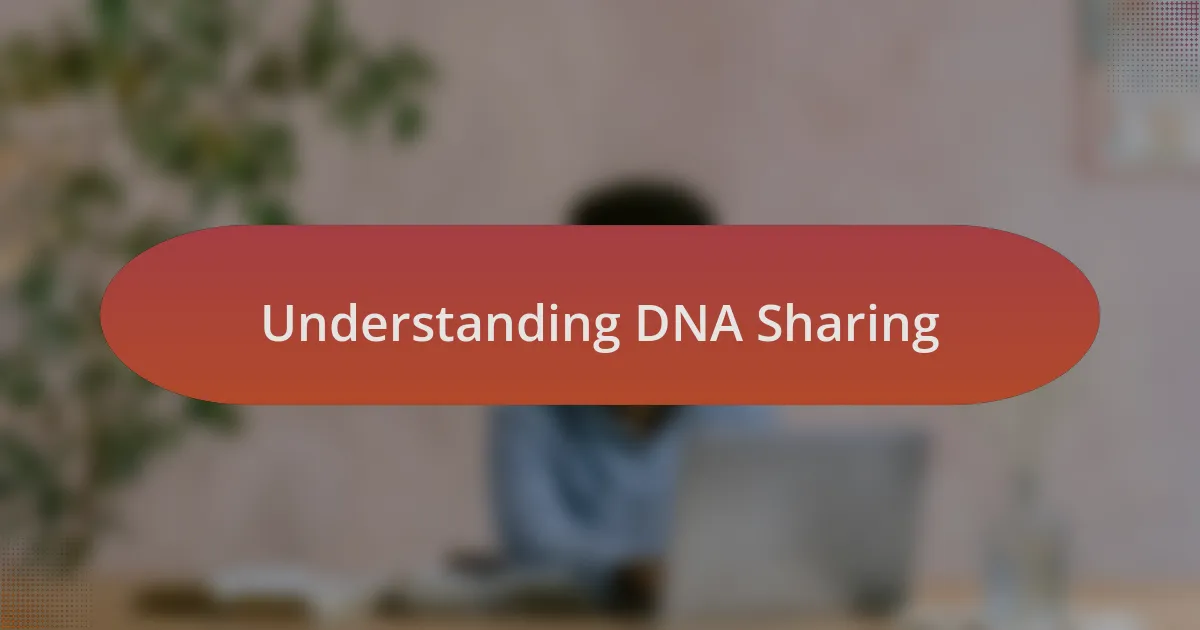
Understanding DNA Sharing
Understanding DNA sharing can be a complex journey, especially as I reflect on my experiences with it. When I first submitted my DNA for a genealogy test, I was excited about uncovering hidden branches of my family tree. However, the moment I clicked “submit,” I realized that I had also shared a part of my genetic identity with a network of strangers. What does it truly mean to open up your biological history to the world?
As I navigated through the results, I couldn’t help but wonder about the implications of my decision. I discovered not only my ancestry but also potential health risks and genetic traits that might affect my family. It raised questions: What responsibilities do I have towards my relatives? How might this information impact their lives? It’s easy to feel overwhelmed by the weight of such revelations, especially when they touch on personal issues and privacy.
In discussing DNA sharing with friends, I often find a mix of excitement and apprehension in their reactions. Some are eager to learn about their ancestry, while others hesitate, concerned about privacy and the risks involved. This divide made me realize that understanding DNA sharing isn’t just about the science behind it; it’s also about the emotional landscape it affects in our relationships and identities. How do we weigh the thrill of discovery against the potential repercussions of sharing our most intimate information?

Importance of DNA in Genealogy
DNA plays a pivotal role in genealogy by serving as a direct link to our ancestors. When I received my DNA results, the vivid picture of my heritage not only satisfied my curiosity but also provided a sense of belonging. It fascinated me to see how my genetic makeup traced back to regions I had only heard of in stories.
The accuracy of DNA testing can unveil connections I never imagined existed, such as unknown siblings or distant relatives. I recall the day I connected with a third cousin through a DNA match; our family trees intertwined in a way that brought us together. This experience reaffirmed the power of DNA in unearthing familial ties that time and distance had obscured.
Moreover, DNA doesn’t just tell us where we come from; it leads to questions about where we fit in today. Every revelation, like the discovery of a long-lost family member, comes with a whirlwind of emotions. How do we reconcile the excitement of newfound connections with the responsibility of understanding our genetic legacy? For me, the journey of exploring my DNA has been as much about identity as it has been about ancestry.
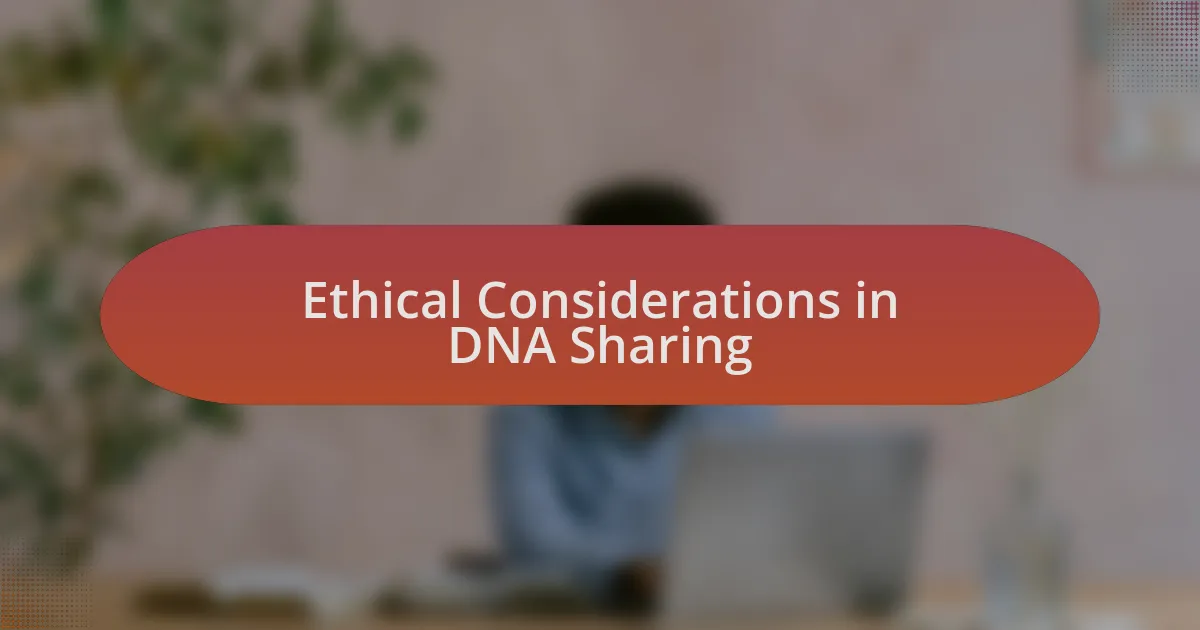
Ethical Considerations in DNA Sharing
It’s vital to consider the ethical implications when sharing DNA data, especially in the context of privacy. I remember when I decided to upload my DNA results to a public database; that moment came with a wave of uncertainty. This decision felt like opening a door, allowing others to peek into my genetic information. Could I trust that my data would be used responsibly?
Then there’s the question of consent, especially regarding relatives. If a family member tests their DNA, it might reveal information about me that I wasn’t prepared to share. I find myself reflecting on how one person’s decision can impact the privacy of others. Did they consider how their results might affect the entire family dynamic?
Finally, we must contemplate the potential misuse of this genetic information. As I explore my ancestry, I can’t help but wonder: what if my data ends up in the wrong hands? It’s a thought-provoking issue, as the same DNA that connects us can also become a source of exploitation if not handled with respect and care.
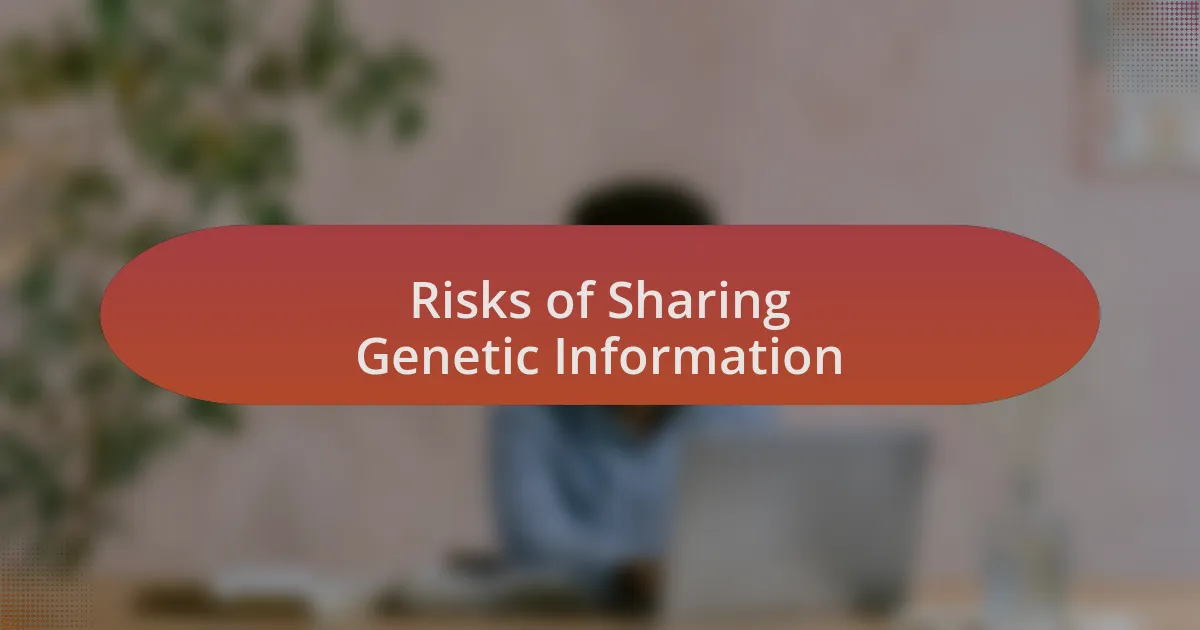
Risks of Sharing Genetic Information
When I think about the risks of sharing genetic information, one major concern is the potential for discrimination. Imagine discovering that your DNA data could be used by insurance companies to deny you coverage because of a predisposition to certain health issues. It’s a troubling thought that keeps me up at night. How fair is it that our genetic makeup, something we did not choose, could lead to unfair treatment?
Another risk I’ve considered is identity theft, which creates a chilling effect on one’s sense of security. Sharing DNA could inadvertently allow someone to replicate or manipulate your genetic identity. I remember a friend who hesitated to share their results because of this fear, and I understood their concerns. What if someone used that information not just for identity theft, but for more nefarious purposes? It’s a risk that definitely makes one reconsider where and how to share personal genetic data.
Additionally, there’s the emotional toll involved in uncovering difficult family secrets through shared genetic information. When I explored my own heritage, I found unexpected relatives, which was fascinating but also unsettling. What if someone uncovers information about their ancestry that alters their perception of self or familial connections? The psychological implications can be profound, making the act of sharing genetic information much more than just a simple data exchange.
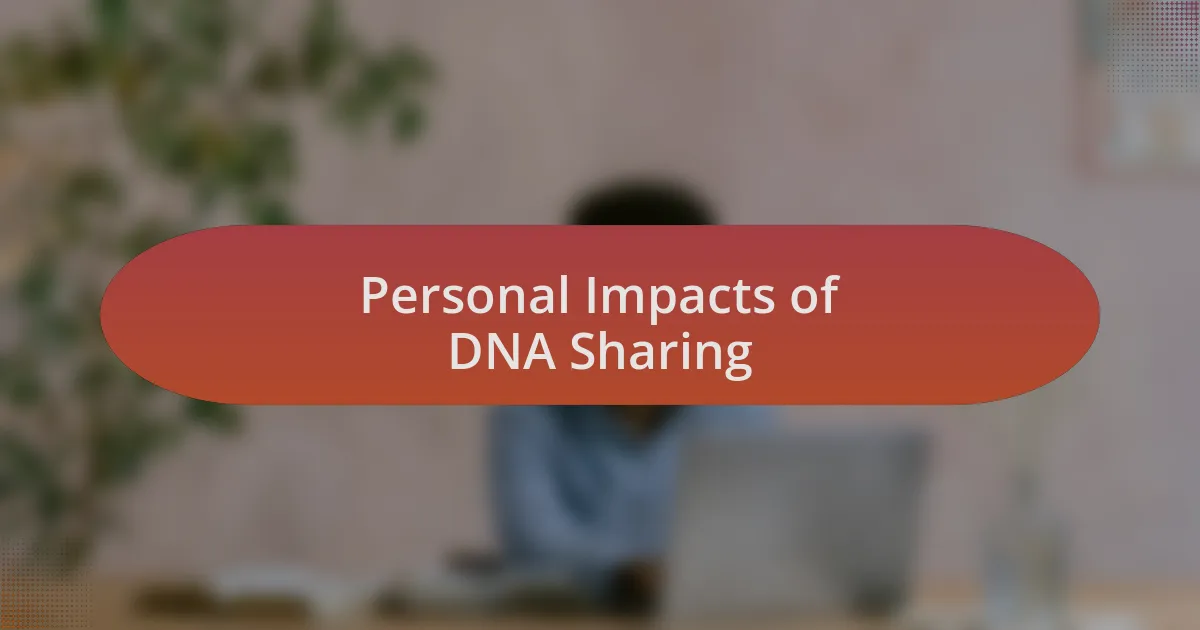
Personal Impacts of DNA Sharing
Sharing DNA can profoundly affect personal identity and relationships. I experienced this firsthand when a distant cousin reached out after I posted my results online. It was exhilarating to connect over shared ancestry, but it also stirred unexpected feelings about family dynamics. How does one reconcile the newfound connections with existing family ties? It’s a question that can lead to both excitement and confusion.
On a more personal level, the decision to share DNA often weighs heavily on family members. I recall a discussion with my parents about whether they should get tested too. The fear of unwanted surprises loomed large—what if we discovered we weren’t who we thought we were? These moments of vulnerability reveal how deeply intertwined our sense of self is with our genetic makeup, making the sharing of such information a potentially life-altering decision.
The emotional landscape of DNA sharing is complex. I remember feeling both pride and anxiety when I finally decided to share my findings publicly. While it was liberating to embrace my heritage, I couldn’t shake the nagging thought: what if those closest to me reacted differently than I anticipated? Such fears illustrate how sharing DNA can ripple through a family, revealing truths that may be better left buried or celebrated, depending on individual perspectives.
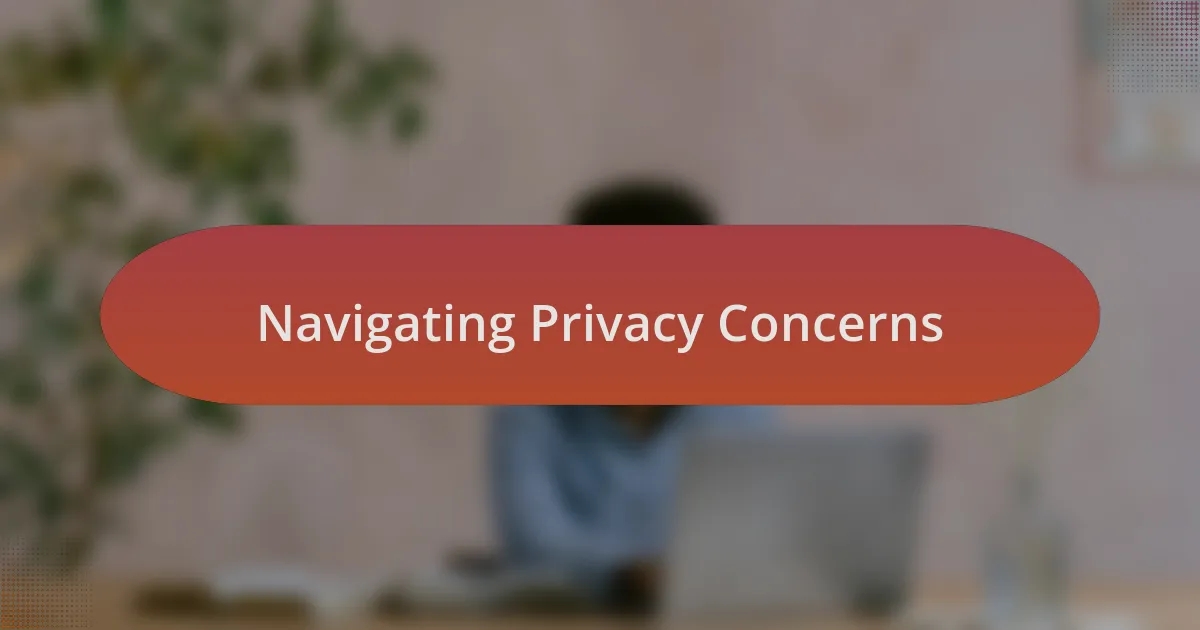
Navigating Privacy Concerns
When it comes to sharing DNA, privacy concerns often feel overwhelming. I remember attending a genealogy workshop where a speaker passionately discussed the risks of data breaches. The thought of my genetic information being exposed left me feeling vulnerable; how much control do we truly have over our own data once it’s shared? Such dilemmas raise critical questions about who holds the right to our genetic secrets.
I once found myself grappling with the prospect of joining a consumer DNA database. While the allure of uncovering my ancestry was tempting, the potential misuse of my genetic data made me pause. What if it was used for purposes beyond personal discovery? These worries highlighted the need for clear consent and robust protections; safeguarding our genetic identity is as crucial as the knowledge itself.
Navigating the labyrinth of privacy issues surrounding DNA sharing can be daunting. I often think about the ethical responsibilities that come with possessing this information. As I dive deeper into my family history, I can’t help but wonder: am I equipped to handle the revelations and responsibilities that come with it? Each discovery could lead to a cascade of implications, both personally and ethically, urging me to tread carefully as I pursue my genetic journey.
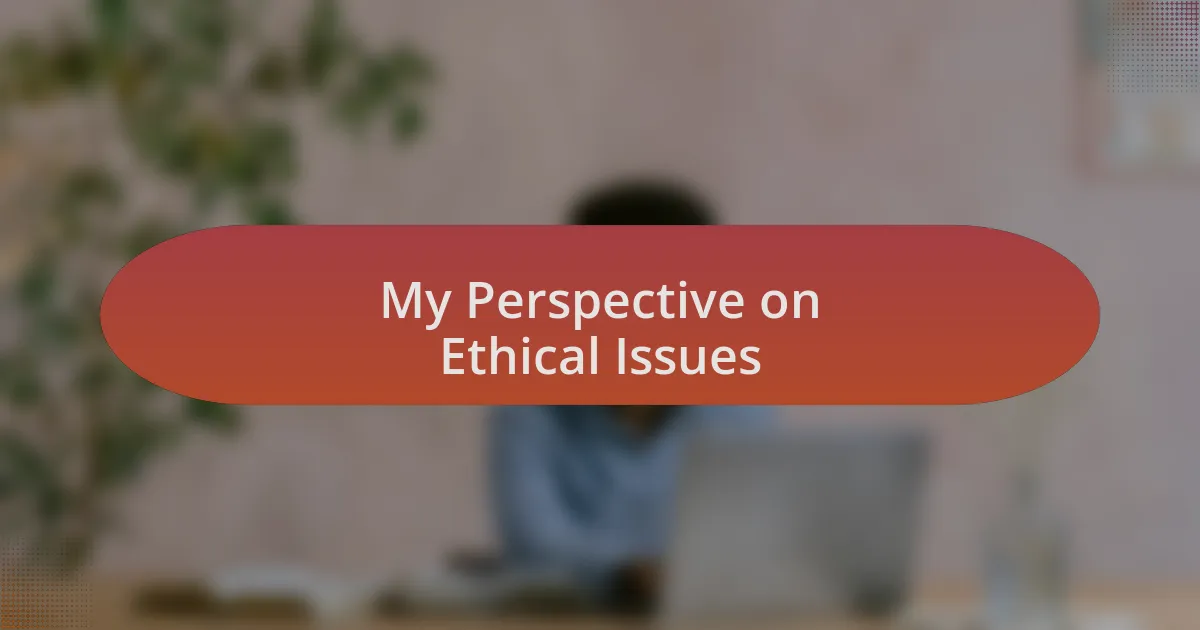
My Perspective on Ethical Issues
Exploring the ethical landscape surrounding DNA sharing often leaves me with a sense of unease. I recall a discussion with a friend who works in the field of bioethics. He highlighted how easily our genetic data can be de-identified but that doesn’t erase my worries about its potential misuse. Who benefits from this information, and at what cost to individuals like us?
As I’ve reflected on my own experiences, I realize how intertwined our DNA is with our identities. I once discovered a surprising family connection while piecing together genetic data. That moment was thrilling, yet I was left wondering: does sharing this information risk exposing those I care about? The sheer complexity of relationships woven through our genetic strands emphasizes our ethical duty to consider how our choices affect loved ones.
There’s also a lingering doubt about the future implications of DNA sharing. I think back to times when I’ve hesitated to share my ancestry results with others. What if a distant relative isn’t ready for the truths that may arise from those findings? This awareness creates an internal dialogue about the responsibility we carry when unlocking the secrets our DNA holds, not just for ourselves, but for our broader kin.